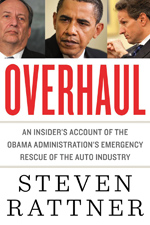Originally published in the Financial Times
In April 1977, as a young energy correspondent for The New York Times, I watched Jimmy Carter label the energy problem the “moral equivalent of war” and propose an ambitious plan to curb the use of expensive ($15 per barrel!) oil. Today, five presidents later, oil sits firmly above $100 per barrel, and America still lacks anything resembling a comprehensive energy strategy.
As a result, with petrol prices rising dangerously near all-time highs, energy has again become a national focus and a central issue in the 2012 presidential campaign. The political attacks of Republicans and Democrats are replete with ironies: Republicans charge President Barack Obama with failing to prevent the rise in oil prices. He responds, correctly, that short-term price movements reflect global forces and are not easily controlled.
But four years ago, when petrol prices reached a record $4.11 per gallon, he attacked Republicans for precisely the same failure and Republicans returned fire exactly as he is responding today.
Missing from this argument is a basic understanding of what America (or any country) can do about the cost of petroleum-based energy, even over a number of years: nothing. Oil is a worldwide commodity, with roughly 87m barrels a day produced and consumed around the globe. Of this, the US accounts for less than 25 per cent, roughly 19m b/d. Equally significantly, as a result of higher production, more conservation and a sluggish economy, that is down from about 21m b/d in 2005. In that same period, global usage increased.
The US could have drilled more (as Republicans want), increased development of alternative sources such as solar (as Democrats stress) and conserved more (as everyone says they want) without discernibly changing pump prices.
Similarly, the current debate in the US over the Keystone XL pipeline, which would shuttle crude from Canada’s tar sands into the US heartland, misses the point.
While approving a more environmentally sensitive version of the pipeline would bring welcome investment and jobs, Keystone would neither lower oil prices nor improve energy security, as some backers suggest. That oil will be produced and find its way on to world markets with or without Keystone.
Nonetheless, with growing demand, limited production capacity and tensions with Iran pushing up global prices, all oil-importing countries should implement sensible measures to curb the need for petroleum products. Every barrel of imported oil represents a financial transfer to oil-exporting countries, draining wealth from the consuming nations.
The most important point for Americans is any mention of – let alone support for – the most powerful and effective way of achieving the twin goals of greater efficiency and less consumption of oil: tax. For decades, European countries have employed stiff excise taxes to hold down their use of petrol. Britain, for example, imposes tax of about $4 per gallon, nearly 10 times US levels. America, whose petrol use comprises about half of its crude oil consumption, could do the same, while rebating the additional tax collections to consumers.
But in the US, the barest mention of increasing these taxes has been a form of political suicide. (In 2008, two presidential hopefuls – notably, not including Mr Obama – even suggested suspending the existing tax to hold down soaring prices.)
Instead, since the mid-1970s the US has relied on regulation (corporate average fuel economy standards) to raise the energy efficiency of cars.
While those standards, with higher prices, have successfully raised the fuel efficiency of the average American car from 13 miles per gallon in the early 1970s to 27 today, they have done nothing to curb the American propensity to drive, drive, drive. Each year, Americans travel an average of 12,000 miles in their cars, compared with about 8,500 for the British. Using regulation instead of market forces has brought all the usual difficulties of enforcement, while layering the extra costs of compliance on to carmakers (which, of course, can’t vote.) Beyond the desirability of using market forces to achieve energy goals, the answer to the endless questions of production versus conservation and conventional versus alternatives is simple: we need all of them, including nuclear.
In retrospect, the Carter energy policy – quickly derided by the press – appears hopelessly naive, with its talk about cutting consumption, use of solar and building electric cars. The question for America is whether it will be ready, at long last, to get on with the job after the election-year follies have been concluded.


